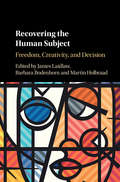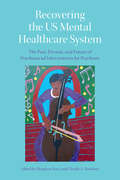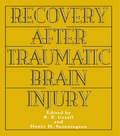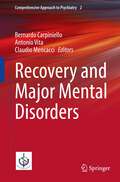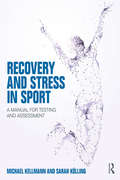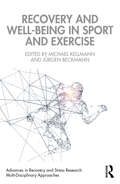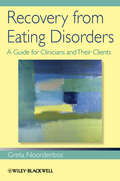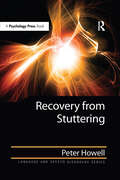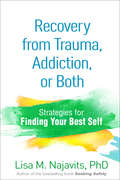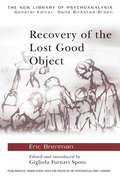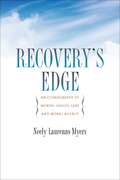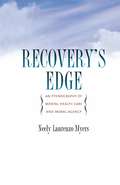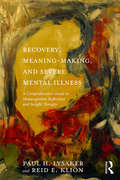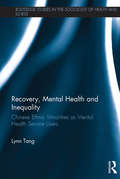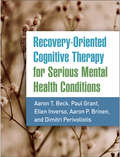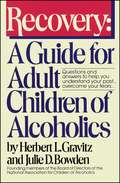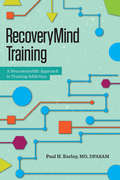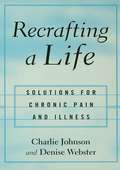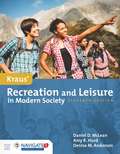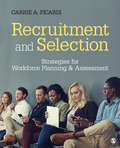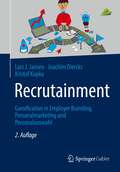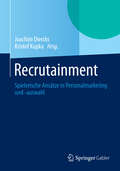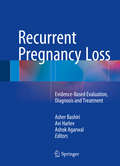- Table View
- List View
Recovering the Human Subject: Freedom, Creativity and Decision
by James Laidlaw Martin Holbraad Barbara BodenhornThis volume responds to the often-proclaimed 'death of the subject' in post-structuralist theorizing, and to calls from across the social sciences for 'post-humanist' alternatives to liberal humanism in a distinctively anthropological manner. It asks: can we use the intellectual resources developed in those approaches and debates to reconstruct a new account of how individual human subjects are contingently put together in diverse historical and ethnographic contexts? Anthropologists know that the people they work with think in terms of particular, distinctive, individual human personalities, and that in times of change and crisis these individuals matter crucially to how things turn out. The volume features a classic essay by Caroline Humphrey, 'Reassembling individual subjects', that provides a focus for the debate, and it brings together a distinguished collection of essays, which exhibit a range of theoretical approaches and rich and varied ethnography.
Recovering the US Mental Healthcare System: The Past, Present, and Future of Psychosocial Interventions for Psychosis
by Meaghan Stacy Charlie A. DavidsonDecades of research show that psychosocial treatments are effective for psychosis, yet they remain unimplemented as the American healthcare system relies primarily on pharmacological solutions instead. This book reviews the history and current state of research to provide a more nuanced understanding of the evidence for and barriers to psychosocial care for psychosis. It addresses a wide range of mental health research and multi-professional practice domains from historical, personal, societal, professional, and systems perspectives. The varied perspectives presented illustrate factors that limit support for recovery in SMI and psychosis as well as real hope for recovering the US mental healthcare system. With contributions of experts by training and by experience, this book represents an essential resource for students, practitioners and researchers.
Recovery After Traumatic Brain Injury (Institute for Research in Behavioral Neuroscience Series)
by Henry H. Stonnington B. P. UzzellEmotions, behaviors, thoughts, creations, planning, daily physical activities, and routines are programmed within our brains. To acquire these capacities, the brain takes time to fully develop--a process that may take the first 20 years of life. Disruptions of the brain involving neurons, axons, dendrites, synapses, neurotransmitters or brain infrastructure produce profound changes in development and functions of the one organ that makes us unique. To understand the functions and development of the brain is difficult enough, but to reverse the consequences of trauma and repair the damage is even more challenging. To meet this challenge and increase understanding, a host of disciplines working and communicating together are required. The International Association for the Study of Traumatic Brain Injury tried to correct this limitation during its meetings of international clinicians, researchers, and scientists from many fields. It was felt that many of the outstanding thoughts and ideas from the participants' most recent meeting and from others working in the field of traumatic brain injury (TBI) should be shared. This book was conceived not as proceedings of the conference, but as a collection of knowledge for those working in the acute and chronic recovery aspects of head injury. This book reflects the importance of the team approach to patients with TBI. The chapter authors come from a diverse array of disciplines--basic science, neurosurgery, neurology, radiology, psychology, neuropsychology, and legal, consumer, and speech/language science. Their contributions provide the most current research and the latest ways of managing a variety of aspects of TBI.
Recovery and Major Mental Disorders (Comprehensive Approach to Psychiatry #2)
by Antonio Vita Bernardo Carpiniello Claudio MencacciThe book provides a clear and comprehensive description of both personal and clinical recovery in severe mental disorders, including schizophrenia and related disorders, and mood disorders such as major depression and bipolar disorders. Divided into two main parts: recovery in schizophrenia and related disorders, and recovery in mood disorders, it offers a broad overview of the factors associated with better or worse outcomes in terms of recovery, as well as the rates (how many people affected by mental disorders may gain recovery), and the time course (how long people affected by mental disorders take to recover) of recovery. It also discusses in detail the pharmacological and psychosocial interventions that can be considered recovery-oriented. Covering the main aspects of recovery in major mental disorders, the book is intended for professionals, scholars, students and anyone interested in mental health.
Recovery and Stress in Sport: A Manual for Testing and Assessment
by Michael Kellmann Sarah KöllingBalancing training, stress, and recovery is essential for achieving optimal performance. The performance of professional athletes can be severely compromised by overtraining, injuries, prolonged periods of competition, or even life events outside their sporting lives. The current recovery-stress state depends on preceding stress and recovery activities, but through simultaneous assessment of stress and recovery, a differentiated picture can be provided. This manual includes two measurement instruments to gauge individual recovery, enabling both athletes and coaches to better understand the often-unconscious processes that impinge upon peak performance, and to monitor the physical, mental, emotional, mental, and overall recovery-stress state before and after training. The Acute Recovery and Stress Scale (ARSS) and the Short Recovery and Stress Scale (SRSS) are instruments that systematically enlighten the recovery-stress states of athletes. Through utilization of the ARSS and the SRSS, athletes and coaches can better understand the importance of daily activities, including how they can relate to stress/recovery and the direct impact on athletic performance. In addition to the instruments themselves, both of which are simple and easy to use, the manual also discusses their development, their basis in theory, and case studies showcasing their usage. The ARSS and the SRSS provide important information regarding the current recovery-stress state during the process of training, and are essential tools for coaches, sport scientists, sport psychologists, and athletes alike.
Recovery and Well-being in Sport and Exercise: Interdisciplinary Insights
by Michael Kellmann Jürgen BeckmannBringing together the world’s leading experts, this multi-disciplinary collection examines both the psychological and physiological dimensions to recovery from sport. Featuring chapters on overtraining, sleep, the relationship to injury, as well as the role of stress, this volume illustrates how performance, both as an individual and within of a team, can be better managed through understanding the recovery process. It also covers the impact of travel on performance, as well as guidance on measurement and training. Based upon the contemporary models of recovery and performance in different scientific disciplines such as medicine, neuroscience, psychology, and sport science, expert contributors also explore implications for applied and strategic interventions to retain and stabilize performance ability. This is a must-have resource for students and scholars across the sports sciences as well as any coach interested in the latest research. This book in this new series is essentially a new edition of the book Sports, Recovery, and Performance under a new title, Recovery and Well-being in Sport and Exercise. Even though there is a large overlap between the 2018 book and this first book of the series, several modifications have been made: some chapters were omitted, new chapters were added, and some chapters have been substantially updated and revised.
Recovery from Eating Disorders
by Greta NoordenbosWith a uniquely perspective on the key factors in recovery from eating disorders, this practical guide for patients and clinicians draws from relevant, real-life case studies.Focuses on real-life recovery strategies that involve motivational factors, physical and psychological health, and issues such as self-esteem, body attitude, emotion regulation and social relationships.Draws on extensive qualitative research with more than 80 former sufferersOffers experience-based guidance for professionals assisting clients in their recovery process
Recovery from Stuttering
by Peter HowellThis book is a comprehensive guide to the evidence, theories, and practical issues associated with recovery from stuttering in early childhood and into adolescence. It examines evidence that stuttering is associated with a range of biological factors — such as genetics — and psychological factors — such as anxiety — and it critically assesses theoretical accounts that attempt to integrate these findings. Written so that it can be used flexibly to meet the demands of courses about stuttering, the book may be used as a text at the undergraduate or graduate level in psychology or speech-language science.
Recovery from Trauma, Addiction, or Both: Strategies for Finding Your Best Self
by Lisa M. NajavitsTrauma and addiction are two of the most common and difficult issues that people face--but it truly is possible to heal. In this motivating book, leading expert Lisa Najavits explains the link between trauma and addiction and presents science-based self-help strategies that you can use no matter where you are in your recovery. Every chapter features inspiring words from people who have "been there," plus carefully designed reflection questions, exercises, and other practical tools. Learn how you can: *Build coping skills so that the future is better than the past. *Keep yourself safe and find support. *Set your own goals and make a plan to achieve them at your own pace. *Choose compassion over self-blame and shame. *Move toward your best self--the person you want to be. Mental health professionals, see also the author's Seeking Safety: A Treatment Manual for PTSD and Substance Abuse, which presents an evidence-based treatment approach developed specifically for PTSD and substance abuse.
Recovery of the Lost Good Object (The New Library of Psychoanalysis)
by Eric BrenmanRecovery of the Lost Good Object brings together the hugely influential papers and seminars of Eric Brenman, revealing his impact on the development of psychoanalysis and allowing a better understanding of his distinctive voice amongst post-Kleinian analysts. Gathered together for the first time in one volume, Eric Brenman's papers give the reader a unique insight into the development of his clinical and theoretical thinking. They highlight many issues which are relevant to the present debate about psychoanalytic technique, including: The Narcissism of the Analyst Hysteria The Recovery of the Good Object Relationship Meaning and Meaningfulness Cruelty and Narrowmindedness The Value of Reconstruction in Adult Psychoanalysis The second half of the book documents three of the clinical seminars and covers the transgenerational transmission of trauma, the analysis of borderline pathology and the psychoanalytical approach to severely deprived patients. This collection will be welcomed by all psychoanalysts and psychotherapists, and other members of the helping professions interested in investigating the valuable contribution that Eric Brenman has made to contemporary psychoanalysis.
Recovery's Edge: An Ethnography Of Mental Health Care And Moral Agency
by Neely Laurenzo MyersIn 2003 the Bush Administration's New Freedom Commission asked mental health service providers to begin promoting "recovery" rather than churning out long-term, "chronic" mental health service users. Recovery's Edge sends us to urban America to view the inner workings of a mental health clinic run, in part, by people who are themselves "in recovery" from mental illness. In this provocative narrative, Neely Myers sweeps us up in her own journey through three years of ethnographic research at this unusual site, providing a nuanced account of different approaches to mental health care. Recovery's Edge critically examines the high bar we set for people in recovery through intimate stories of people struggling to find meaningful work, satisfying relationships, and independent living. This book is a recipient of the Norman L. and Roselea J. Goldberg Prize from Vanderbilt University Press for the best book in the area of medicine.
Recovery's Edge: An Ethnography of Mental Health Care and Moral Agency
by Neely Laurenzo MyersIn 2003 the Bush Administration's New Freedom Commission asked mental health service providers to begin promoting "recovery" rather than churning out long-term, "chronic" mental health service users. Recovery's Edge sends us to urban America to view the inner workings of a mental health clinic run, in part, by people who are themselves "in recovery" from mental illness.In this provocative narrative, Neely Myers sweeps us up in her own journey through three years of ethnographic research at this unusual site, providing a nuanced account of different approaches to mental health care. Recovery's Edge critically examines the high bar we set for people in recovery through intimate stories of people struggling to find meaningful work, satisfying relationships, and independent living.This book is a recipient of the Norman L. and Roselea J. Goldberg Prize from Vanderbilt University Press for the best book in the area of medicine.
Recovery's Edge: An Ethnography of Mental Health Care and Moral Agency
by Neely Laurenzo MyersIn 2003 the Bush Administration's New Freedom Commission asked mental health service providers to begin promoting "recovery" rather than churning out long-term, "chronic" mental health service users. Recovery's Edge sends us to urban America to view the inner workings of a mental health clinic run, in part, by people who are themselves "in recovery" from mental illness. In this provocative narrative, Neely Myers sweeps us up in her own journey through three years of ethnographic research at this unusual site, providing a nuanced account of different approaches to mental health care. Recovery's Edge critically examines the high bar we set for people in recovery through intimate stories of people struggling to find meaningful work, satisfying relationships, and independent living.This book is a recipient of the Norman L. and Roselea J. Goldberg Prize from Vanderbilt University Press for the best book in the area of medicine.
Recovery, Meaning-Making, and Severe Mental Illness: A Comprehensive Guide to Metacognitive Reflection and Insight Therapy
by Paul H. Lysaker Reid E. KlionRecovery, Meaning-Making, and Severe Mental Illness offers practitioners an integrative treatment model that will stimulate and harness their creativity, allowing for the formation of new ideas about wellness in the face of profound suffering. The model, Metacognitive Reflection and Insight Therapy (MERIT), complements current treatment modalities and can be used by practitioners from a broad range of theoretical backgrounds. By using metacognitive capacity as a guide to intervention, MERIT stretches and strengthens practitioners’ capacity for reflection and allows them to better use their unique knowledge to help people who are confronting the suffering and chaos that often comes from psychosis. Clinicians will come away from this book with a variety of tools for helping clients manage their own recovery and confront the issues that accompany an illness-based identity.
Recovery, Mental Health and Inequality: Chinese Ethnic Minorities as Mental Health Service Users
by Lynn TangMental health has long been perceived as a taboo subject in the UK, so much so that mental health services have been marginalised within health and social care. There is even more serious neglect of the specific issues faced by different ethnic minorities. This book uses the rich narratives of the recovery journeys of Chinese mental health service users in the UK – a perceived ‘hard-to-reach group’ and largely invisible in mental health literature – to illustrate the myriad ways that social inequalities such as class, ethnicity and gender contribute to service users' distress and mental ill-health, as well as shape their subsequent recovery journeys. Recovery, Mental Health and Inequality contributes to the debate about the implementation of ‘recovery approach’ in mental health services and demonstrates the importance of tackling structural inequalities in facilitating meaningful recovery. This timely book would benefit practitioners and students in various fields, such as nurses, social workers and mental health postgraduate trainees.
Recovery-Oriented Cognitive Therapy for Serious Mental Health Conditions
by Aaron T. Beck Paul Grant Ellen Inverso Aaron P. Brinen Dimitri PerivoliotisFrom pioneering treatment developers, this book describes recovery-oriented cognitive therapy (CT-R). This evidence-based approach empowers people given a serious mental health diagnosis such as schizophrenia to build a better life in their chosen community. CT-R provides innovative strategies to help individuals shift from a "patient" mode to an adaptive mode of living and take positive steps to pursue valued aspirations. Vivid case vignettes and sample dialogues illustrate ways to access the adaptive mode with people experiencing negative symptoms, delusions, hallucinations, communication difficulties, self-harming or aggressive behavior, and other challenges. In a convenient large-size format, the book includes reproducible handouts and forms. Purchasers get access to a companion website where they can download and print the reproducible materials, plus two online-only tip sheets relevant to COVID-19 and telehealth, and find a link to related videos.
Recovery: A Guide for Adult Children of Alcoholics
by Herbert L. Gravitz Julie D. BowdenRich with insight and awareness, Recovery explores the secrets, fears, hopes and issues that confront adult children of alcoholics. Authors and widely respected therapists and ACOA workshop leaders Herbert Gravitz and Julie Bowden detail in a clear question-and-answer format the challenges of control and inadequacy that ACOAs face as they struggle for recovery and understanding, stage-by-stage: Survival* Emergent Awareness* Core Issues* Transformations* Integration* Genesis.If you feel troubled by your post, Recovery will start you on the path of self-awareness, as it explores the searching questions adult children of alcoholics seek to hove answered:* How con I overcome my need for control?* Do all ACOAs ploy the some kind of roles in the family?* How do I overcome my fear of intimacy?* What is all-or-none functioning?* How can ACOAs maintain self-confidence and awareness after recovery?* How do ACOAs handle the family after understanding its influence?* And many other important questions about your post, family and feelings.Written with warmth, joy and real understanding, Recovery will inspire you to meet the challenges of the post and overcome the obstacles to your happiness.
RecoveryMind Training: A Neuroscientific Approach to Treating Addiction
by Paul H. EarleyAn innovative guide for professionals that establishes an extraordinary approach to understanding the dynamics of addiction and the recovery process. RecoveryMind Training (RMT) includes state-of-the-art information on neuroscience and behavioral techniques. RMT challenges readers to see addiction from a different perspective and introduces a structured treatment model that will put order to the chaos typically found with addiction.
Recrafting a Life: Coping with Chronic Illness and Pain
by Charles Johnson Denise WebsterChronic illness and pain are now, more than ever, seen asas major problems in the current health care system. Because they are unresponsive to both antibiotics and surgery, theyr are seen as elusive and mysterious. The National Medical Expenditure Survey estimates that over 80 million U.S. citizens live with a chronic illness. The most prevalent are arthritis, diabetes, respiratory diseases, hypertension and mental illness. This book uses the novel Robinson Crusoe as an archetypal metaphor for the patients who must learn to survive on their own isolated "island" of chronic pain. This unique style is combined with a variety of in-session approaches and other tools which clients have found helpful in identifying their goals and progress. By emphasizing the importance of self-care the authors hope to diminish the sense of helplessness felt by the both the patients their loved ones.
Recreation And Leisure In Modern Society
by Amy Hurd Daniel McLean Denise M. AndersonEach new print copy includes Navigate 2 Advantage Access that unlocks a comprehensive and interactive eBook, student practice activities and assessments, a full suite of instructor resources, and learning analytics reporting tools. Reorganized and streamlined to enhance learning outcomes, the eleventh edition of Kraus' Recreation and Leisure in Modern Society provides a detailed introduction to the history, developments, and current trends in leisure studies. The Eleventh Edition focuses on the challenges and opportunities impacting the profession--including dramatic demographic changes, new technologies, and innovations in marketing--through an array of pedagogical features, including engaging sidebars and case studies addressing contemporary issues. Focusing on the ten different types of organizations--ranging from nonprofit community organizations and armed forces recreation to sports management and travel and tourism sponsors--the Eleventh Edition is an invaluable resource for students considering a career in the recreation and leisure industry. With Navigate 2, technology and content combine to expand the reach of your classroom. Whether you teach an online, hybrid, or traditional classroom-based course, Navigate 2 delivers unbeatable value. Experience Navigate 2 today at www.jblnavigate.com/2.
Recruitment and Selection: Strategies for Workforce Planning & Assessment
by Carrie A. PicardiThe workforce is changing and talent management is more important than ever. Recruitment and Selection: Strategies for Workforce Planning & Assessment unpacks best practices for designing, implementing, and evaluating strategies for hiring the right people. Using a proven job analysis framework, author Carrie A. Picardi uses her academic and industry experience to teach students how to assess candidates in an accurate, legal, and ethical manner. With clarity and relevance, this book truly bridges theory and concept with practice in an engaging manner and will benefit students who need to hit the ground running to successfully manage workforce needs and activities in a myriad professional settings.
Recruitment and Selection: Strategies for Workforce Planning & Assessment
by Carrie A. PicardiThe workforce is changing and talent management is more important than ever. Recruitment and Selection: Strategies for Workforce Planning & Assessment unpacks best practices for designing, implementing, and evaluating strategies for hiring the right people. Using a proven job analysis framework, author Carrie A. Picardi uses her academic and industry experience to teach students how to assess candidates in an accurate, legal, and ethical manner. With clarity and relevance, this book truly bridges theory and concept with practice in an engaging manner and will benefit students who need to hit the ground running to successfully manage workforce needs and activities in a myriad professional settings.
Recrutainment: Gamification in Employer Branding, Personalmarketing und Personalauswahl
by Joachim Diercks Kristof Kupka Lars J. JansenRecrutainment hat sich in den letzten Jahren zu einem deutlich sichtbaren und allgemein akzeptierten Instrument in der Personalgewinnung entwickelt: Immer mehr Organisationen setzen auf spielerisch-simulative Elemente in Berufsorientierung, Employer Branding, Personalmarketing und Recruiting. Recrutainment ist die Gamification der Personalgewinnung.Self-Assessments, unterhaltsam und spielerisch-informativ gestaltete Online-Assessments, Berufsorientierungsspiele oder auch Offline-Recrutainment-Events verbessern nachweislich das stimmige Zusammenfinden von Kandidat und Arbeitgeber und versprechen so nicht nur eine optimale Stellenbesetzung, sondern stärken auch das Profil der Arbeitgebermarke.Diese zweite Auflage unter dem Titel Recrutainment ist kein Herausgeber-, sondern ein vollständig neu entwickeltes Autorenwerk. Die wissenschaftliche Basis von Recrutainment wird umfassend herausgearbeitet sowie die Ergebnisse empirischer Forschung vorgestellt. Zahlreiche Praxisbeispiele zeigen verschiedene Facetten von Recrutainment und die vielfältigen Einsatzmöglichkeiten in der Unternehmenspraxis. Das Buch richtet sich sowohl an HR-Praktikerinnen und -Praktiker als auch an Studierende, die die Grundlagen der psychologischen Personalauswahl und des Personalmarketings kennenlernen möchten. Der InhaltPersonalgewinnung, -marketing und -auswahlRecrutainment – die Gamification des RecruitingsOffline-Recrutainment – Vom Event vor Ort bis zum Blended-RecrutainmentSelf-Assessments – Online-Recrutainment in der SelbstauswahlOnline-Assessments – Online-Recrutainment in der Fremdauswahl
Recrutainment: Spielerische Ansätze in Personalmarketing und -auswahl
by Joachim Diercks and Kristof KupkaUm gute Mitarbeiter zu finden, reichen die üblichen Wege im Recruiting längst nicht mehr aus: Immer mehr Organisationen setzen auf Recrutainment, also den Einsatz spielerisch-simulativer Elemente in Berufsorientierung, Employer Branding, Personalmarketing und Recruiting.Self-Assessments, unterhaltsam und informativ gestaltete Online-Assessments, Berufsorientierungsspiele oder auch Offline-Recrutainment-Events verbessern nachweislich das stimmige Zusammenfinden von Kandidat und Arbeitgeber und versprechen so nicht nur eine optimale Stellenbesetzung, sondern stärken auch das Profil der Arbeitgebermarke. Das Buch liefert das theoretische Fundament für das Thema Recrutainment und erklärt, warum dessen Bedeutung in den letzten Jahren so stark zugenommen hat. Es werden die Auswirkungen von Recrutainment auf Organisationen und Bewerber unter Einbeziehung von aktuellen Studien beleuchtet. In ausgewählten Best Practice Beispielen stellen verschiedene Autoren dar, wie Recrutainment in der Unternehmenspraxis eingesetzt wird.
Recurrent Pregnancy Loss
by Ashok Agarwal Avi Harlev Asher BashiriProviding the latest evidence-based information on etiology, evaluation and treatment, this unique text provides an in-depth, comprehensive discussion of the epidemiology, genetic and endocrinologic factors and medical and surgical management of recurrent pregnancy loss (RPL). Taking a multidisciplinary approach including psychological treatment and patient perspectives, all aspects of current RPL prevention and treatment are elucidated. Detailed chapters provide real-world illustrative material and cover the set-up and management of RPL clinics and databases, containing practical tips. Recurrent Pregnancy Loss will be an excellent resource for OB-GYN specialists, general and reproductive endocrinologists, radiologists, hematologists, psychiatrists, psychologists, and any other investigators or clinicians treating patients confronted with this emotionally and physically trying condition.
